US election: The women who hold the key to Trump's survival
By Tara McKelvey
BBC News, East Norriton, Pennsylvania
-
- Published
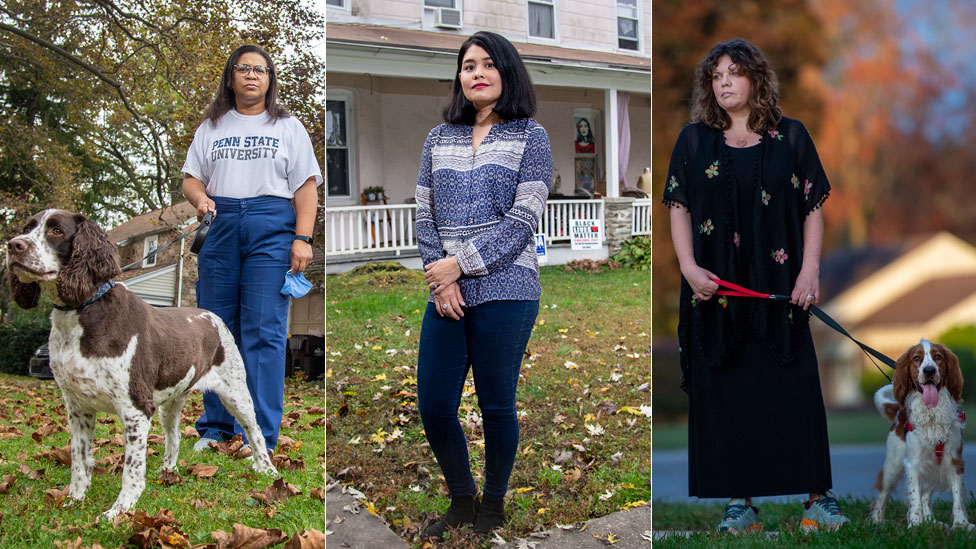
Kimberly Kriebel shows me a house she wants - a lovely brick home near her mother-in-law's place in East Norriton, a suburb of Philadelphia. Kriebel and her husband live in an apartment that is about a mile away, and she is pining for a place with a small lot for their dog.
"I get yard envy when I walk through here," she says on a Sunday afternoon, reining in Duke, a Welsh springer spaniel, as they head up a street littered with golden leaves. Kriebel, 46, says she admires Trump's pro-business policies and thinks that she and her husband will have a better chance at buying a house if Trump stays in office.
"Definitely he's handled the economy well," she says. She admires him for other reasons, too. She grew up in a Christian home, and she appreciates his position on abortion and the way that he supports religious freedom: "We have been impressed."
Her positive views of Trump are echoed by others in the neighbourhood. But not all.
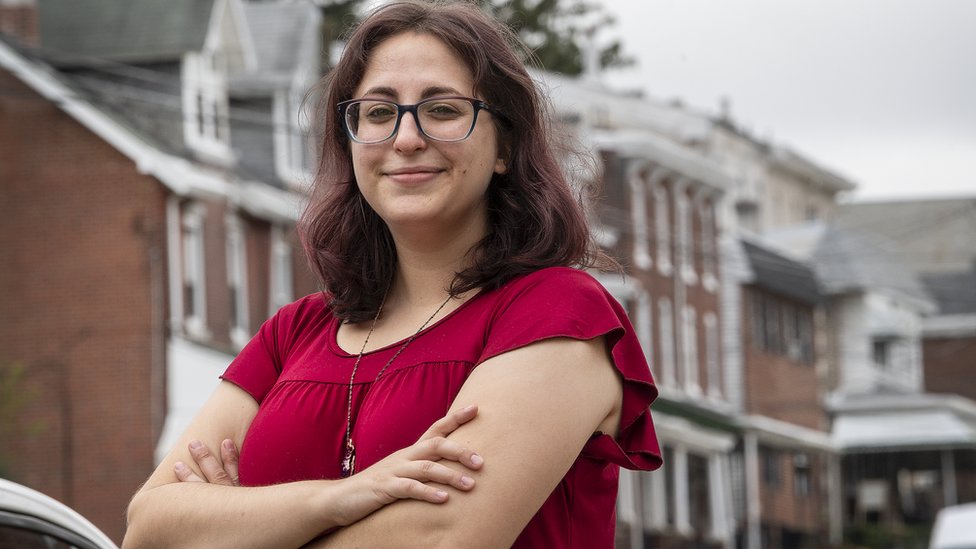
On that afternoon, Kriebel strolls past a yard sign for Joe Biden, the Democratic nominee. Another spaniel - an English springer - in the house spots her dog, Duke, through a window and barks in a friendly way. Duke wags his tail.
Meryl Daly-Parker, 54, a registered nurse, comes outside.
When I ask her about Trump, she lets out a laugh. It is a short one. She says she is concerned about systemic racism, the virus and high unemployment: "There are so many things that we as a nation are struggling with," she says. In her opinion, Trump has made things worse.
Two suburban women - two distinct views of the president.

'Will you please like me?'
The female vote has always been important in elections: women cast their ballots at a higher rate than men do,
research by Pew suggests.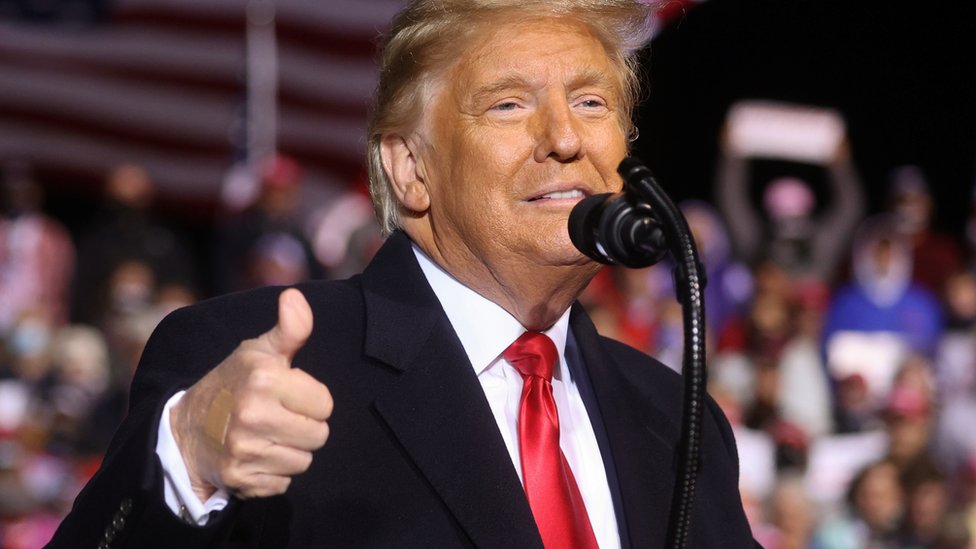
The views of female voters have got even more attention during this campaign because Trump is trying to bridge a gender gap - among women voters, he lags behind his rival, Joe Biden. According to a recent poll by ABC, 61% of female voters in Pennsylvania support Biden, while only 38% say they back Trump.
Pennsylvania is a battleground state that could determine the outcome of the election. For that reason, the women who live in the state now have even more clout.
Trump is trying to win these women over. He tells them that he is keeping their neighbourhoods safe from crime and warns them about Democratic policies of affordable housing that could change the look and feel of their suburban streets.
At a Michigan rally, Trump asked: "Would you like a nice low-income housing project next to your suburban beautiful ranch style house?" At other rallies, too, he has spoken to them directly.
"Suburban women, please vote for me," he said at a rally in Nevada. "I'm saving your house. I'm saving your community. I'm keeping your crime way down." At times, he struck a plaintive tone: "Will you please like me?' he said to women during a Pennsylvania rally.
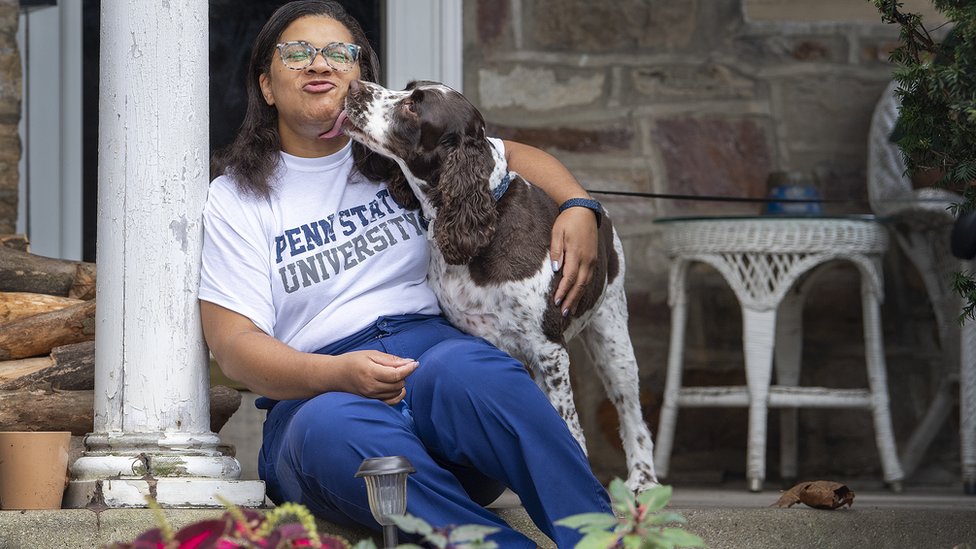
Biden has also been courting female voters. His agenda includes many of the issues that interest suburban women, such as climate change, healthcare and universal pre-school. Joe Biden "has the character it takes to get things done," his wife, Jill, told Pennsylvania women in a virtual event that was held over the summer. "And he has the vision to re-imagine our future."
With all the attention that women in the suburbs have been getting from the candidates, it seemed like the right moment to find out from the women themselves what their lives are like and how they see these two men.

A house divided
The street where Kimberly Kriebel, a Trump supporter, and Meryl Daly-Parker, a Biden supporter, met on that afternoon reflects a larger story about the American suburbs.
Suburbs used to be white and conservative. Today, neighbourhoods such as the one where Daly-Parker lives are more racially diverse and progressive. In some cases, they are divided.
At a semi-detached house on a nearby street, one side has a Trump sign, and the other side has a Biden sign.
"The Biden sign went out first," Kriebel, a social worker, says. "Then the Trump sign went up."
Still Democrats have the upper hand in this county, Montgomery: there are about 300,000 registered Democrats and about 210,000 Republicans.


Daly-Parker and her husband, Tony Parker, say the political transformation has unfolded over the two decades that they have lived there.
"You can walk around and see all these Biden signs," says Tony Parker, who helps run the town's polling station. He points at the blue-shaded signs in yards near their house. "When I first moved here, there weren't that many Democrats."
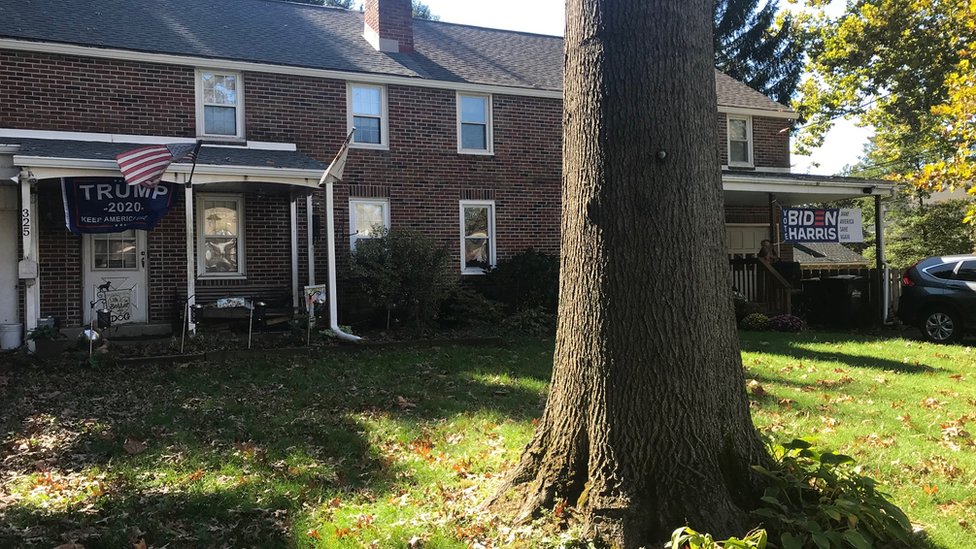
Kriebel is also part of a powerful trend - a white suburban woman who supports Trump. Some political observers assumed that women would rally behind a female candidate, Hillary Clinton, during the last election. Yet many felt the way that Kriebel did - Trump, however flawed, was a stronger candidate.
Another Trump supporter, Dasha Pruett, 51, who has worked as an executive assistant at an insurance company and lives in a nearby suburb, Drexel Hill, says that she likes his tax cuts, immigration policies and his "law and order" message.
"What he wants is safety and security in our country," says Pruett, who emigrated to the US from Moscow when she was 10.
"This is resonating for suburban women very clearly. We have to bring normalcy back. We are losing respect for one another, and we're turning into a godless country."
Pruett is now running for Congress as a Republican, and she hopes Trump will have a chance to serve another term.
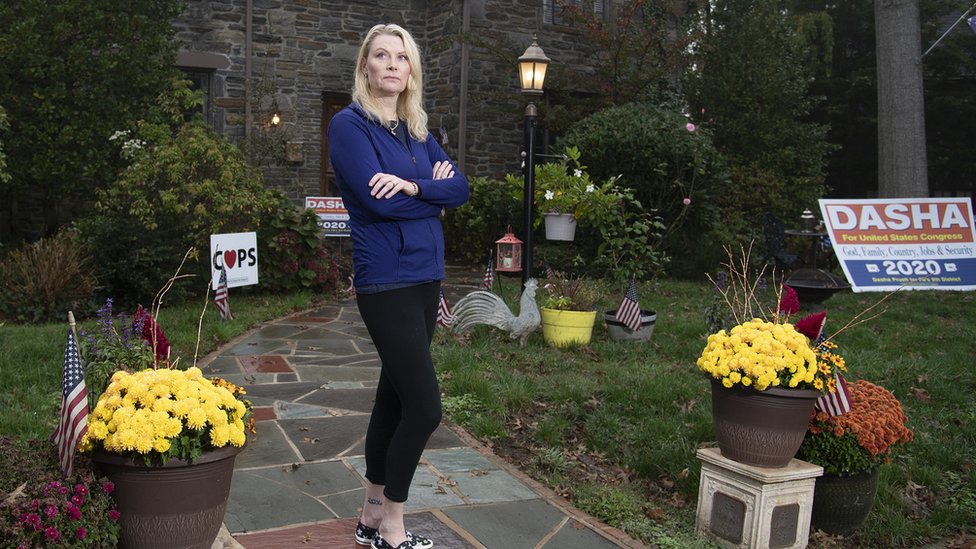
"The stock market is still doing great, and there's a reason for that," she says. "I think it's because of his policies. He puts his attention on the American workers."
"I like that the president is putting America first," she says, adding: "I like that he is focusing on blue-collar workers."
Back in 2016, she and many other suburban women spoke admiringly about Trump: overall, 52% of white women voted for him. Lately, though, his support among white suburban women has slipped. According to national surveys, 54% support Biden, and 45% back Trump.

Suburban 'blowback'
In Bridgeport, a suburb that also lies in Montgomery County, Beth Jacksier, 29, a librarian, holds onto a Biden poster in the midst of a blustery afternoon.
Standing near a patch of sunflower stalks - "my quarantine hobby" - she says she was stunned by Trump's decision to withdraw from the Paris agreement on climate change.
"I'm looking for someone who will not destroy our country," she says.
Referring to Trump, she says that he has been trying to dismantle the Paris agreement and other work done by the Democrats when they were in office.
Jacksier has another yard sign, one that says "Black Lives Matter". This one is sturdier than the poster board with Biden's name on it.
The words that appear on the sign are painted on a white wood pallet, one that is set upright and looks like a picket fence.
She and other suburban women say when Trump talks about the suburbs, he evokes an image of a street with 1950s-style homes, the kind with white picket fences.
He is aiming his message at "white women who he thinks want to be separate from black people", says Sandra Thompson, a 52-year-old lawyer who lives in a suburb of York, Pennsylvania.
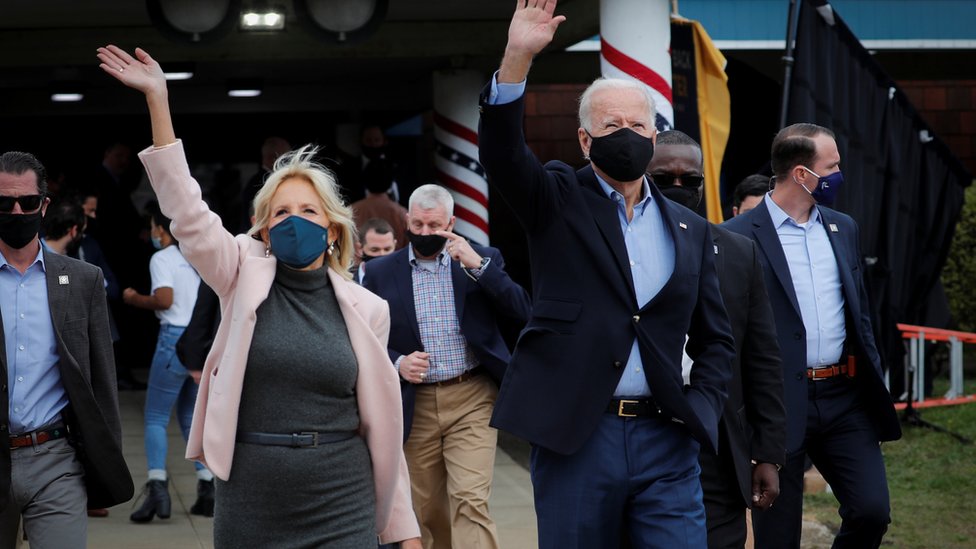
The president has been accused of racial dog-whistles in warning the suburbs will be destroyed by a Biden presidency, although Mr Trump has noted on occasion that African-American families and people of colour now live alongside white families, and suburbia reflects the mixture of races, religions and ethnicities that make up the country as a whole.
Thompson and other women who live in the suburbs have recoiled at the president's warnings about housing policies and potential violence.
"To use that as a scare tactic is so inappropriate," Daly-Parker, a nurse, says.
Danielle Kwock Phillips, 39, a law student who lives in Narberth, feels the same.
She says: "As a suburban woman, I want diversity. If low-income housing is being built on my street, I'm more than happy to have it. We want diversity in terms of socio-economics and in terms of race."
Their views were echoed by most of the 30 or so suburban women I interviewed for this article.
The president's language is "blatantly racial", says Lawrence Levy, the executive dean of the National Center for Suburban Studies at Hofstra University in Hempstead, New York.
He adds: "We've seen blowback from suburban women."
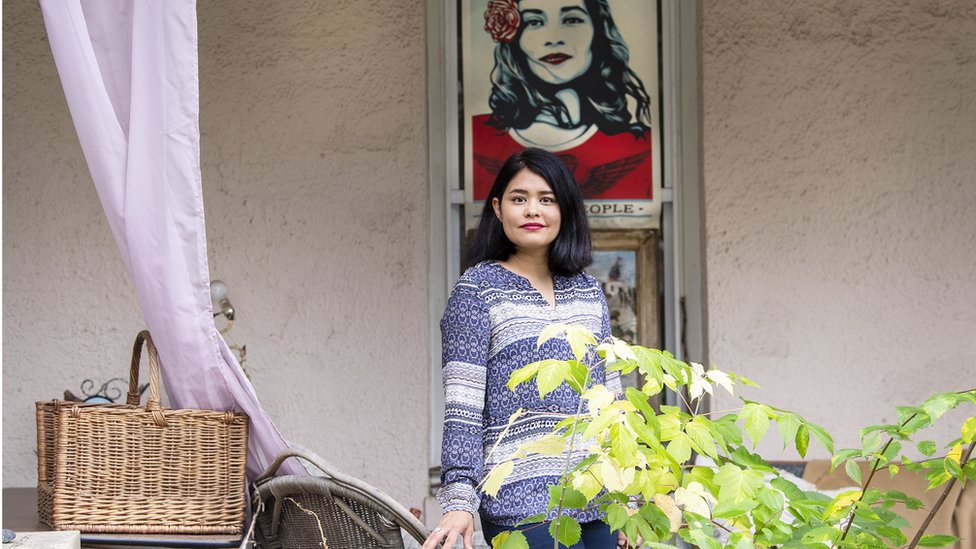
For Daly-Parker, the issues that matter the most are not related to crime. She is concerned about the pandemic, healthcare and racism: "I have African-American children, and this is not a world that I want them to live in." Her opinion about Trump has dipped even lower in recent months.
Daly-Parker was infected with the coronavirus earlier this year, and so was her husband and one of their daughters. They are fine, but she knows in a visceral way what it means to live through the pandemic. The president's comments about the virus - that people should not be afraid - and his demeanour during the debates were both distasteful, she says.
"Whether it's Covid or the debate, it's embarrassing," Daly-Parker says. 'He just lacks leadership. He thinks you can come to a debate and be that disrespectful. It's a tactic to keep people from understanding that he doesn't have a platform."
During the debates, Kwock Phillips says she was struck by the president's "ability to swivel - to change topics so quickly you don't even know it's happening".
She says he avoids questions about "white supremacy stuff", a subject that matters to her: "As a person of colour, it's important to me to have a president who acknowledges issues of race."
In contrast, Biden's emphasis on common decency and respect for others has struck a chord for her and other women in the suburbs.
"I appreciate Joe Biden's tone and how he speaks to people," Daly-Parker says. "This guy remembers people, and he can talk directly to them. He's somebody who understands them. It's real, and people need real."

A personal stake
Many of the women whom I met in the suburbs said they were not all that engaged in politics before Trump. He made things personal - today, some see him in a heroic light; for others, he is a dark force. Either way, the stakes are high for them.
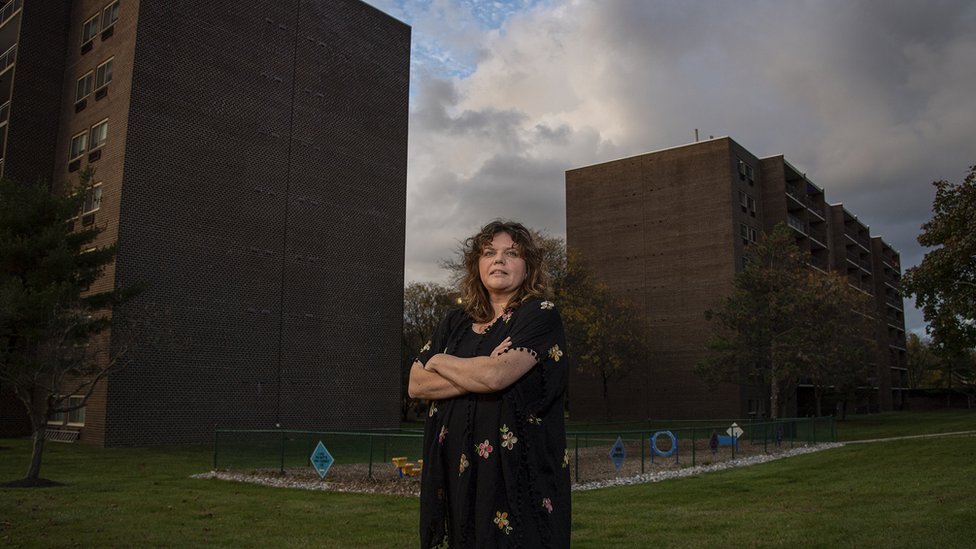
Kriebel says she supports his efforts at deregulation and likes how he has fought against government bureaucracy. She says she worries about a Democratic victory and how that might change her own financial situation.
"Biden's talked about raising taxes by trillions of dollars," she says. "That's kind of scary."
She does not want taxes to go up, especially since she and her husband are trying to buy a house: "All the things they keep saying are going to be free. You know it's not really going to be free. They've talked about free college and free healthcare for immigrants. Why do I have to pay for that?"
Daly-Parker is just as passionate about the election, yet she sees things differently. She says the president has failed to lead. "We need change," she says. Then she climbs in her car, slams the door and heads to work.
.
"who" - Google News
October 30, 2020 at 05:31AM
https://ift.tt/2HKz2fm
US election: The women who hold the key to Trump's survival - BBC News
"who" - Google News
https://ift.tt/36dvnyn
https://ift.tt/35spnC7
Bagikan Berita Ini














0 Response to "US election: The women who hold the key to Trump's survival - BBC News"
Post a Comment